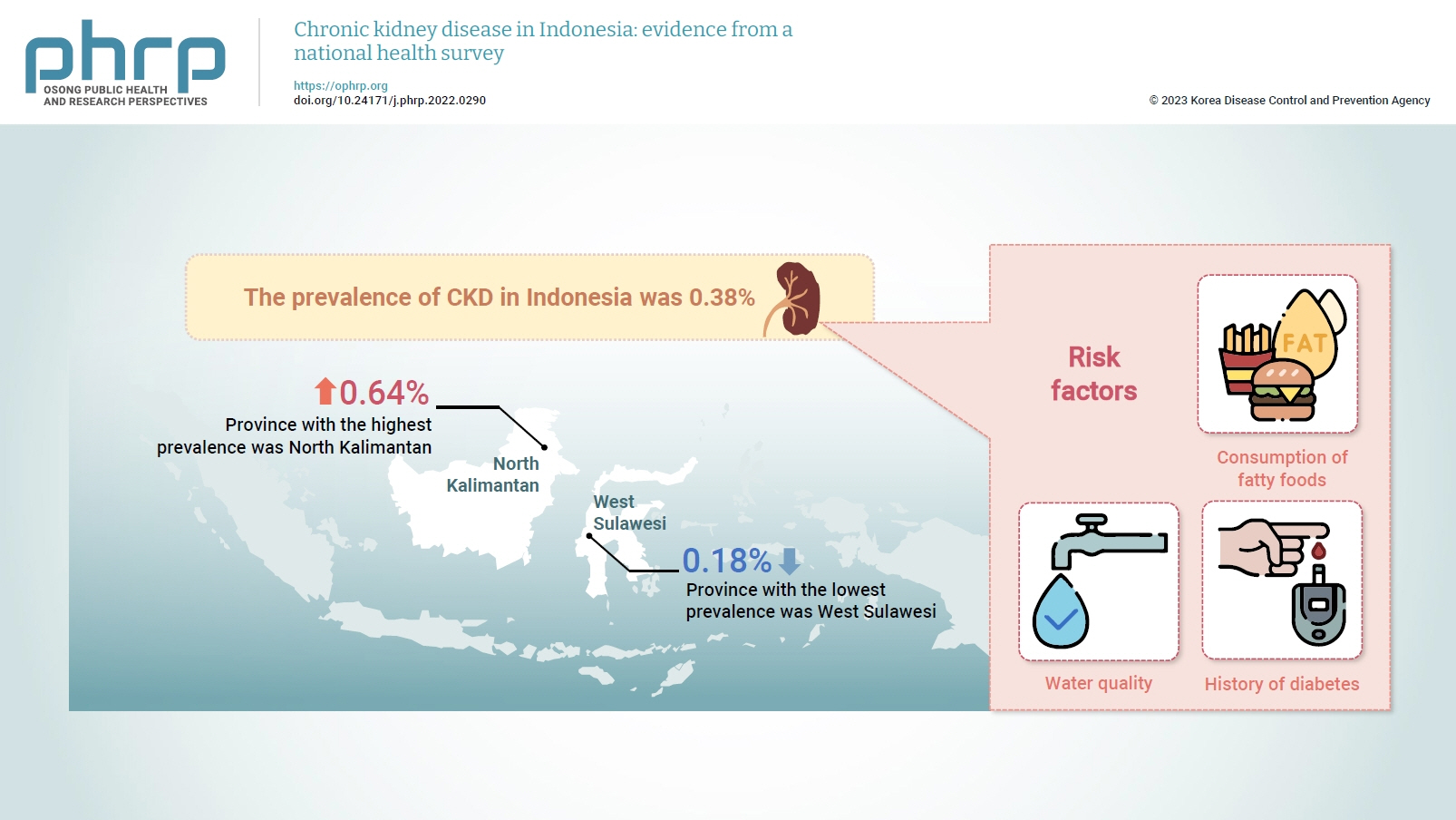Search
- Page Path
- HOME > Search
Original Articles
- Chronic kidney disease in Indonesia: evidence from a national health survey
- Puti Sari Hidayangsih, Dwi Hapsari Tjandrarini, Noor Edi Widya Sukoco, Nikson Sitorus, Ika Dharmayanti, Feri Ahmadi
- Osong Public Health Res Perspect. 2023;14(1):23-30. Published online February 14, 2023
- DOI: https://doi.org/10.24171/j.phrp.2022.0290
- 3,259 View
- 233 Download
-
 Graphical Abstract
Graphical Abstract
 Abstract
Abstract
 PDF
PDF 
- Objectives
Several previous studies have stated that consuming certain foods and beverages might increase the risk of chronic kidney disease (CKD). This study aimed to examine the relationships of food and beverage consumption with other risk factors for CKD. Methods: Data sources included the 2018 Basic Health Research (Riskesdas) and the National Socio-Economic Survey (Susenas), which were analyzed using a cross-sectional design. The study samples were households from 34 provinces in Indonesia, and the analysis was performed with provincial aggregates. Data were analyzed using risk factor analysis followed by linear regression to identify relationships with CKD. Results: The prevalence of CKD in Indonesia was 0.38%. The province with the highest prevalence was North Kalimantan (0.64%), while the lowest was found in West Sulawesi (0.18%). Five major groups were formed from 15 identified risk factors using factor analysis. A linear regression model presented 1 significant selected factor (p=0.006, R2 =31%). The final model of risk factors included water quality, consumption of fatty foods, and a history of diabetes. Conclusion: Drinking water quality, fatty food consumption, and diabetes are associated with CKD. There is a need to monitor drinking water, as well as to promote health education and provide comprehensive services for people with diabetes, to prevent CKD.
- Relationship Between Water Intake and Metabolic/Heart Diseases: Based on Korean National Health and Nutrition Examination Survey
- Soobin Jang, Chunhoo Cheon, Bo-Hyoung Jang, Sunju Park, So-Mi Oh, Yong-Cheol Shin, Seong-Gyu Ko
- Osong Public Health Res Perspect. 2016;7(5):289-295. Published online October 31, 2016
- DOI: https://doi.org/10.1016/j.phrp.2016.08.007
- 3,108 View
- 23 Download
- 5 Crossref
-
 Abstract
Abstract
 PDF
PDF - Objectives
The aim of this study was to identify the correlation between adequate water intake and the prevalence of metabolic/heart diseases.
Methods
We analyzed the data from the 2012 Korea National Health and Nutrition Examination Survey. All participants were divided into Group Above Adequate Intake (n = 736) and Group Below Adequate Intake (n = 4,819) according to water intake. The thresholds were 1.8 L for men and 1.4 L for women based on the World Health Organization report findings. Logistic regression analyses were performed to verify the correlation between water intake and prevalence of hypertension, diabetes mellitus, dyslipidemia, myocardial infarction, and angina pectoris.
Results
There were significant differences between the two groups in terms of the following variables: age, smoking, alcohol, stress, dietary supplements, body weight, physical activity, total calorie intake, water intakes from food, and sodium intake. Participants in Group Above Adequate Intake showed a higher prevalence of hypertension [odds ratio (OR) = 1.22; 95% confidence interval (CI), 0.58–2.55], diabetes mellitus (OR = 1.38; 95% CI, 0.51–3.73), angina pectoris (OR = 0.94; 95% CI, 0.47–1.86), and myocardial infarction (OR = 5.36; 95% CI, 0.67–43.20) than those in Group Below Adequate Intake, whereas the latter showed a slightly higher prevalence of dyslipidemia (OR = 2.25; 95% CI, 0.88–57.84) than the former.
Conclusion
There was no statistically significant association between water intake and any of the metabolic/heart diseases. However, further studies on water intake are needed to confirm our findings. -
Citations
Citations to this article as recorded by- Low daily water intake profile—is it a contributor to disease?
Lawrence E Armstrong, Michael F Bergeron, Colleen X Muñoz, Stavros A Kavouras
Nutrition and Health.2024;[Epub] CrossRef - Water intake and risk of type 2 diabetes: A systematic review and meta-analysis of observational studies
Nasim Janbozorgi, Ramesh Allipour, Kurosh Djafarian, Sakineh Shab-Bidar, Mostafa Badeli, Maryam Safabakhsh
Diabetes & Metabolic Syndrome: Clinical Research &.2021; 15(4): 102156. CrossRef - Changes in feed consumption and water intake among broiler chickens subjected to melatonin treatment during the hot-dry season
Victor Olusegun Sinkalu, Joseph Olusegun Ayo, Joseph Olajide Hambolu, Alexander Babatunde Adelaiye, Friday Ocheja Zakari, Tagang Aluwong
Tropical Animal Health and Production.2020; 52(2): 717. CrossRef - Evaluation of Dietary Habit and Nutritional Intake of Korean Elderly: Data from Korea National Health and Nutrition Examination Survey 2013∼2015
Gyusang Han, Eunju Yang
Journal of the East Asian Society of Dietary Life.2018; 28(4): 258. CrossRef - Water intake from foods and beverages and risk of mortality from CVD: the Japan Collaborative Cohort (JACC) Study
Renzhe Cui, Hiroyasu Iso, Ehab S Eshak, Koutatsu Maruyama, Akiko Tamakoshi
Public Health Nutrition.2018; 21(16): 3011. CrossRef
- Low daily water intake profile—is it a contributor to disease?



 First
First Prev
Prev


